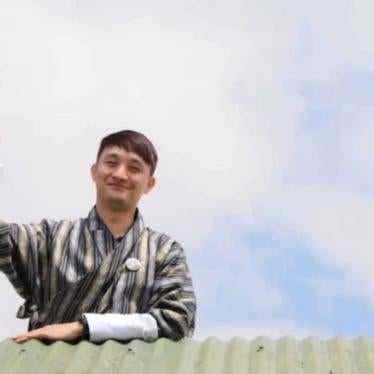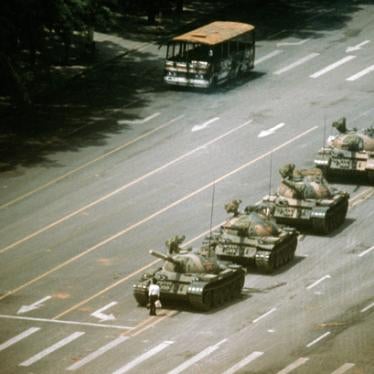(紐約)-人權觀察今天表示,不丹皇家政府應撤銷數十名政治犯的定罪並予釋放。這些政治犯據稱遭受酷刑,並因不公正審判入獄數十年。
這些和平的政治、反歧視和其他社會運動人士以危害國家安全罪名被捕,並由不丹司法機關定罪判處重刑。相關案件均早於2008年,在不丹由絕對君主制轉為君主立憲制之前發生。目前尚在獄中者皆背負重刑,包括終身監禁。不丹社運人士呼籲旺楚克國王特赦這些囚犯。
「不丹公開宣揚的『國民幸福總值』原則並未顧及這群被不當定罪而在獄中度過數十寒暑的政治犯,」人權觀察南亞區主任米納克希・甘古利(Meenakshi Ganguly)說。「不丹當局應正視漫長刑期對這些囚犯及其家屬造成的傷害,並予以緊急補救。」
不丹政治犯人數迄今不明,人權觀察目前收集到37名仍在服刑囚犯的資料,其初次被捕時間介於1990年至2010年之間。他們大多與一般囚犯分開關押,條件極差,當中許多人患有生理或心理疾病,而且被禁止與家屬定期通信。
這些官方認定為「政治犯」的受刑人,大多是以嚴厲且措詞含糊的1992年《國家安全法》定罪。按照不丹法律,「凡陰謀、計畫、教唆、煽動或著手顛覆三元素(Tsa-Wa-Sum,意指國王、國家和人民)而被定罪者」即為政治犯。人權觀察找到37件個案,主要都是以這項罪名判刑,其中至少24人被判處無期徒刑不得假釋,其餘囚犯刑期介於15到43 年。
這群人中的大多數——32 名囚犯——來自不丹境內操尼泊爾語的洛昌人(Lhotshampa,意為「南方人」)社群,數十年來持續遭受不丹政府的歧視和虐待。1990年代初期,由於法律歧視、公民權爭議以及不丹安全部隊普遍濫權所引發的危機,迫使逾9萬名洛昌人逃往尼泊爾避難。如今這些難民大多已獲美國、加拿大和澳洲收容安置。
其餘5名囚犯屬於沙喬普人( Sharchop,意為「東方人」)社群。這四男一女因涉嫌聯繫被查禁的不丹國民大會黨(Druk National Congress)而被捕,該黨倡導議會民主制和人權保障。
據出獄和在押囚犯及其親屬表示,被捕人士遭到當局刑求逼供和體罰,而且在審判時沒有律師辯護。一名被判叛國和恐怖活動罪的囚犯說:「因為(羈押期間)無情的肉體折磨,我們沒有選擇,只能按照他們(安全部隊)的要求和他們的說詞向法庭認罪。然後由地方法院將我們判處無期徒刑。我們從未得到任何法律辯護。」
許多囚犯家屬表示,他們至今沒有拿到任何官方文件,不知道他們的親屬為何被定罪。出獄囚犯有時也無法用白話或法律名詞解釋自己因為什麼罪名被判處重刑。
不丹社運人士向人權觀察表示,儘管從2008年就已開始推動法制現代化,至今仍然沒有任何人權組織在國內運作,傳媒也避免報導當局認為敏感的話題。因此,政治犯及其悲慘處境很難獲得公眾關注。
在人權觀察確認的32名洛昌人政治犯中,有15人是在1990年代以後因為抗議族群迫害而被捕判刑。其中8人曾為不丹皇家陸軍士兵,因涉嫌參與族群抗爭而被控叛國罪。然而,家屬和已出獄囚犯都無法提供任何有關起訴或判決的司法文書。
據社運人士消息,丹巴・辛・普拉米(Dambar Singh Pulami)在2001年從尼泊爾難民營返回不丹「查看家產」時被捕,後以「勒索、綁架、謀殺和顛覆活動」判刑43年,並因身患重病於2022年5月入院治療。
自2008年以來,在一群1990年代初期隨長輩逃離的年輕難民返回不丹之後,又有15名洛昌人被捕。不丹當局聲稱這些年輕人意圖加入由非法的不丹共產黨所領導、爭取難民返國和少數人權利的武裝抗爭。
他們大多剛剛返國就被抓捕,有些人身上帶著小型武器,另一些人帶著政治宣傳品。法庭檔案顯示,檢方認為這群人的難民身分表示他們已經「背棄國家,決心與不丹為敵」。他們最終以「叛國罪」和「恐怖活動罪」判處無期徒刑,其中12人仍在服刑。
在2008年的案件中,另有三名洛昌人本身並非難民,但被控支援前述返國難民。還有一人在2010年被捕,也被列入同案判處無期徒刑。人權觀察檢視相關法庭檔案發現,此案在程序上未達基本的公正審判標準。
已知37名政治犯中,25人被關在首都廷布附近的成岡(Chemgang)中央監獄專門關押「政治犯」的監區。據受刑人指出,雖然監獄條件在1994至2012年國際紅十字會定期訪視期間稍有改善,近年又有所下降。獄中的食品和衣物供應皆有不足。
包括前士兵在內的另外10名政治犯被關在拉布納(Rabuna)地區的偏遠隱秘設施,極少數由此獲釋的前囚犯之一形容該處「有去無回」。還有2名政治犯,人權觀察無法確認他們的關押地點。
據部分囚犯或其親屬報導,受刑人持續忍受嚴重健康問題,尤其是酷刑後遺症。患病囚犯無法在獄中得到充分治療,一些出獄囚犯表示可能有兩人因此喪生。
人權觀察於2022年11月7日就本報告所載資訊和指控致函不丹政府,未獲任何答覆。
不丹國王依法有權實施特赦。前任國王曾於1999年特赦40名政治犯,包括部分無期徒刑受刑人。2022年,現任旺楚克國王也曾特赦一名無期徒刑政治犯。
聯合國、各捐助國和有關政府應敦促不丹當局無條件釋放政治犯和其他因行使基本人權或因違反正當程序審判而被監禁的人。政府應大幅改革法律體系以符合國際人權法,採取措施終止酷刑並為受害者提供補救,並允許對監獄條件進行獨立監測。
「對政治犯的長期監禁和虐待仍是不丹人權記錄的一大污點,」甘古利說。「不丹當局應該釋放這些囚犯,並著手改革以禁絕拘留期間的酷刑、不公正審判和惡劣的監獄條件。」
相關情況和調查結果詳見下文(僅有英文版)。
Political Prisoners in Bhutan: A History of Discrimination
The population of Bhutan includes three communities that have different religious traditions and ethnic origins, and traditionally speak different languages.
The politically and culturally dominant Ngalop, who are traditionally concentrated in the central and western regions, speak Dzongkha and mostly follow Tibetan Buddhism. The royal Wangchuk dynasty belongs to the Ngalop community and became hereditary kings of Bhutan in 1907. The current king, Jigme Khesar Namgyel Wangchuck, came to the throne following the abdication of his father, King Jigme Singye Wangchuck, in 2008 – the same year that Bhutan adopted parliamentary democracy under constitutional monarchy.
The Sharchhops, concentrated in eastern Bhutan, are descendants of early migrants from Tibet to what is now Bhutan. They traditionally speak Tshangla, and many of them practice Tibetan Buddhism. Some of them joined a campaign for political democracy in the 1990s by the now banned Druk National Congress.
The Nepali-speaking community, known as Lhotshampas, migrated to Bhutan in the 19th century and settled in the then largely uninhabited southern part of the country. Lhotshampas are predominantly Hindu. By the late 1970s the Ngalop establishment had come to see this population as a threat to Bhutan’s cultural identity and to their own dominant position. The government introduced a series of discriminatory citizenship laws, stripping many Lhotshampas of their citizenship, as well as “Bhutanization” laws aimed at enforcing a version of national identity based on Ngalop culture and language.
Protests against these policies broke out in 1990. The police arrested thousands of people who were accused of taking part in the protests, which the government deemed anti-national. Many were tortured and ill-treated. By late 1990, Nepali speakers began to flee Bhutan and within two years about 90,000 Bhutanese refugees were in camps in Nepal. Over the ensuing two decades this population expanded. Between 2008 and 2015, over 100,000 Bhutanese refugees who had been living in the camps in Nepal were resettled in third countries, primarily the United States, Canada, and Australia.
Primarily in the 1990s, but up until 2008, the Bhutanese authorities arrested and prosecuted dozens of people for their alleged participation in protests and other alleged “national security” offenses. Many remain imprisoned.
Methodology
Human Rights Watch was able to identify 37 political prisoners still in prison in Bhutan. Between April and December 2022, Human Rights Watch interviewed 11 former political prisoners and 8 relatives of current prisoners, as well as exiled activists who were able to confirm the identities of those in prison.
Under Bhutan’s 2009 Prison Act, political prisoners are supposed to be held at Chemgang prison and separated from other prisoners. However, Bhutanese authorities provide no information on current political prisoners, and except for a UN working group visit in 2019, there have been no independent inquiries into the prison population. As a result, the Human Rights Watch figure may be an undercount.
Human Rights Watch carried out some interviews with the assistance of the Global Campaign for the Release of Political Prisoners in Bhutan. Human Rights Watch also interviewed former prisoners, witnesses, and relatives of prisoners in the Beldangi refugee camp in Nepal.
All interviews were conducted in English or in Nepali, without financial compensation or other incentives. Some interviewees requested anonymity for security reasons.
Torture
Current and former inmates alleged that the authorities routinely used torture and other ill-treatment to compel detainees to confess to actions that they denied, to make their statements at trial correspond to the prosecution’s allegations or the testimony of other defendants or witnesses, or as a form of punishment.
One prisoner described torture by Bhutanese soldiers after his arrest in 2008:
They [Bhutanese soldiers] arrested us and took us to their barrack, and for 20 days they treated us mercilessly. They used to tie us, and using cane sticks they would beat us continuously on our entire body, but particularly on the bottom of our feet. They beat us so much on our feet they became senseless after a while. They also immersed us in ice cold water. After that they tied our hands and legs for nearly seven days. After seven days they finally gave us some fried corn. They didn’t even allow us to sleep. After that, they prepared a statement as per their own wish and thought, not based on what we said.
The coerced “evidence” was then used at their trial.
They brought us to the district court. The judge asked us, “Do you have anything to say?” So we gave them our statement in writing. But there was no use of that submission. They used their own statements instead.
Those arrested in the 1990s experienced some of the worst abuse. Former prisoners said that during that period torture methods commonly used included chepuwa, which involved crushing the thighs between pieces of wood; beating prisoners then putting them in a sack and taking them away in a vehicle, creating the fear of extrajudicial execution; and the use of stress positions and barbed wire that would leave the prisoner bloody as their strength failed.
“For three years I couldn’t change my clothes, or wash my hands or face,” said Mangal Dhwoj Subba, a former political prisoner who was detained from 1990 to 1998. “They would beat me up, so I confessed, although it wasn’t true.”
Another former political prisoner, Dil Kumar Rai, said that during his interrogation, police and soldiers jumped on his chest, causing pain that recurred for six or seven years. He was shown instruments used for torture including sticks and an electric iron, and believed that detainees were sometimes extrajudicially executed, so he made a confession.
Man Bahadur Rai, a former political prisoner, said that as a 16-year-old, he had participated in the 1990 protests, and later became a refugee in Nepal along with his family. He returned to Bhutan in 1996 for a personal visit and was arrested. He said that during six months in police custody his hands were continually handcuffed except when he was eating, and he was beaten with “whatever they could find,” especially when he refused to admit to things he had not done. Nevertheless, he confessed only to acts of disorder during the 1990 protests in which he said he did participate, and was sentenced to 21 years in prison.
A political prisoner imprisoned from 2006 to 2014 said that during his first six months in army custody he was beaten while being interrogated in a language he couldn’t understand. If he became unconscious during the torture, he said, the soldiers revived him with cold water.
A prisoner who was jailed in 2008 said:
They took me to the local police station. They tortured me for almost two weeks before starting the legal process. Once it [the case] was registered to a court it took five months for trial, and I was tortured quite severely when my statements didn’t match [those of the prosecution]. They used wooden batons. I was handcuffed in front of my body and told to squat on the ground. A soldier would put his leg between my cuffed hands then beat me on the back.
These accounts are consistent with those of the family members of prisoners who remain in prison. “He was tortured,” said the wife of a prisoner who was arrested and convicted in 2008. “I saw his body covered with marks from beating on his back.”
“He was tortured by the army,” said the sister of another prisoner who was arrested in 2008 and remains in prison. “They [the prisoners] were beaten and burned. When I met him, he was very sad, his eyes were full of tears.”
The mother of a man who had been imprisoned since 2008 said she had seen scars on his wrists from being tightly bound for six months and that he said he had been severely beaten, given food mixed with dirt, and locked in a small toilet room for an extended period. The sister of another man who has been in prison since 2008 said her brother is now deaf in one ear because of the beatings he received during his first six months in custody.
Violations of Fair Trial Rights
In 2019, the UN Working Group on Arbitrary Detention interviewed several people then imprisoned under national security legislation. The Working Group found “a number of due process violations when the individuals had been tried some 25 years ago. The Working Group is aware that, at the time, there were no legal practitioners in the country.”
There were no defense lawyers to represent the accused during the period these prisoners were put on trial. All the prisoners Human Rights Watch interviewed said that they and their co-defendants had represented themselves, and that all the lawyers involved in their trial acted on behalf of the government. Former prisoners said that they were produced in court and asked to confirm prosecution statements that had been coerced under torture.
A prisoner who was convicted of national security offenses in the early 1990s called his trial a “farce,” saying, “They forced me to confess to false charges.” Another prisoner, convicted in the early 1990s and sentenced to 24 years in prison on charges he denies, said that police would “torture people when they came back from court in the evening if they denied charges. So out of fear we would confess.… There wasn’t a system with lawyers.”
Former prisoners were sometimes unable to describe the offense for which they had served long sentences, in recognizable or specific legal terms. Similarly, families of serving prisoners said that they have not been provided with any official documentation.
Access to an attorney of one’s choosing and adequate time and resources to prepare a defense are fundamental to the right to a fair trial. Several prisoners who were compelled to represent themselves appeared to have little understanding of court procedure. One said that at the end of his trial he signed the court’s verdict although he was unable to read it and did not know what it said.
A prisoner interviewed by the UN Working Group in 2019 told Human Rights Watch:
We could not talk to them [members of the Working Group] openly. The prison officers came and threatened us before the meeting saying, “Look, you have to live with us. They will leave tomorrow, so think wisely before speaking.” … We did sit with the UN arbitrary detentions team during the meeting, but we were too scared to speak openly about realities and show them the true picture.
Prison Conditions
Twenty-five political prisoners are held in a dedicated block at Chemgang Central Prison. Ten other political prisoners are at Rabuna, a secretive facility used to imprison former soldiers and government officials accused of treason, but information on conditions there or at other prisons where political prisoners may be held is not available.
Prisoners said that their segregated block at Chemgang consists of about 16 cells arranged around an outdoor area. Six cells have toilets while 10 have buckets for that purpose. Prisoners are locked inside their cells from 5 p.m. to 7 a.m. Bedding, including bed covers, is at times completely inadequate in the generally cold climate.
Several said they suffered severe and persistent mental health problems due to the conditions. One woman said that she had found her brother unwell when the family had visited him at Chemgang and had offered to bring medicines. “Police take relatives’ [telephone] numbers and say, ‘We’ll contact you if he gets sick,’ but they never do,” she said.
In 1994, the International Committee of the Red Cross (ICRC) began visiting prisoners held under national security laws in Bhutan. Former prisoners said that there was a significant improvement in political prisoner welfare at Chemgang after the ICRC’s visits but that the conditions declined since the visits ended in 2012.
Many prisoners said that the conditions had worsened in the past year. Information obtained by Human Rights Watch in March 2022 indicated that the prison authorities “have made cuts to the food supplies as compared to before.” Another source said, “They have almost stopped giving any clothes to the prisoners. It is very cold. We used to get firewood during the winter but that has been reduced.”
A current prisoner told his brother about bad conditions in 2022. “Supplies are low,” the brother said. “They have insufficient food. There are no new blankets or mattresses.”
Prisoners are prevented from making or receiving telephone calls to Nepal or other countries where refugees have resettled. Prisoners are also prevented from sending letters, and their families do not know whether the letters they send are delivered. The lack of communication causes anguish to both the prisoners and their families.
Although family visits to inmates were impossible due to the Covid-19 pandemic, when Bhutan closed its borders, the families sometimes received information through prisoners who were allowed to make brief telephone calls to relatives in Bhutan.
In late 2022, humanitarian agencies resumed the process of attempting to arrange family visits with prisoners. However, some refugee families who have resettled as far away as Australia, Canada, or the United States have not been able to make any contact with their imprisoned relatives for years. A currently serving prisoner said he and other prisoners have fallen completely out of contact with their families: “We have no idea. We knew they were in Nepal before. We used to receive letters and even send some letters through the Red Cross, but now even that has stopped.”
Three refugee families chose not to be relocated to a third country, remaining in the now sparsely populated Beldangi refugee camp in Nepal to be closer to their relative imprisoned in Bhutan. “I can’t leave without my son,” said Dambar Kumari Adhikari, the mother of Om Nath Adhikari, a political prisoner. “When we go to see them they seem hopeful that maybe they’ll get released soon. That’s the reason we haven’t left, we’re waiting for them.”
Domestic Legal Standards
Bhutan was an absolute monarchy until 2008, when it adopted a new constitution defining the kingdom as “a democratic constitutional monarchy.” The constitution declares that “[t]he State shall strive to promote those conditions that will enable the pursuit of Gross National Happiness.” Among the internationally recognized human rights protected by constitutional provisions are nondiscrimination and equality before the law, fair trials, and the prohibition of torture.
Bhutan’s legal system is guided by Buddhist principles emphasizing concepts such as “compassion.” Bhutan is not a party to the International Covenant on Civil and Political Rights or the Convention against Torture and Other Cruel, Inhuman or Degrading Treatment or Punishment, but it is bound by customary international human rights law as reflected in the Universal Declaration of Human Rights.
Many political prisoners are held under Bhutan’s National Security Act (NSA) of 1992, which superseded the 1957 law. The NSA’s vague and overbroad provisions forbid treasonable acts against the Tsa-Wa-Sum (“king, people and country”). The law does not define “treasonable acts” or what would constitute “betrayal” or “harm to the national interest.”
Court papers relating to the national security trials that took place in 2008 show that, in addition to offenses under the NSA, defendants were also convicted of parallel offenses under the Penal Code. These include treason (article 327) and terrorism (article 329), which are first-degree felonies punishable by 15 years to life in prison (article 8). Defendants were also charged with possession of illegal weapons (articles 478 to 483). Bhutan abolished the death penalty in 2004.
A uniquely Bhutanese legal institution is kidu, which equates to concepts of “welfare” or “relief.” The king may grant kidu as well as “amnesty, pardon and reduction of sentences.” The Sentencing Guideline of Judiciary of Bhutan, 2022, states that an offender “sentenced to life in prison shall remain in prison until he or she dies or until pardoned or otherwise commuted to a fixed period, or receives Royal pardon, amnesty or clemency.” The UN Working Group on Arbitrary Detention concluded in 2019 that “those detainees serving life sentences have no prospect of release, with the exception of amnesty.”
Recommendations
To Bhutan:
- Quash the convictions and release political prisoners who were prosecuted for exercising their fundamental human rights and freedoms or were convicted on the basis of forced confessions and other serious fair trial violations.
- Provide prompt and adequate remedies to current and former prisoners who suffered torture and other ill-treatment in custody.
- Ensure that all prisoners get basic standards of care including food, adequate bedding, warm clothes, and medical treatment.
- Invite international humanitarian agencies to the prison system and give them full and unrestricted access to prisoners.
- Invite UN special procedures and other experts to advise on reforming the justice system and ensuring prisoner welfare.
- Review the National Security Act and amend it to comply with international standards on human rights protections.
To the United Nations, donors, and concerned governments:
- Raise human rights concerns, including the treatment of prisoners, in discussions with the Bhutan government.
- Publicly call upon Bhutan’s government to comply with fundamental international human rights standards, including the prohibition of torture and ill-treatment, fair trial standards, and the humane treatment of prisoners.
- Expedite the resettlement of released former prisoners to enable them to unite with their families, without regard to national security convictions in Bhutanese courts that did not meet international fair trial standards.








